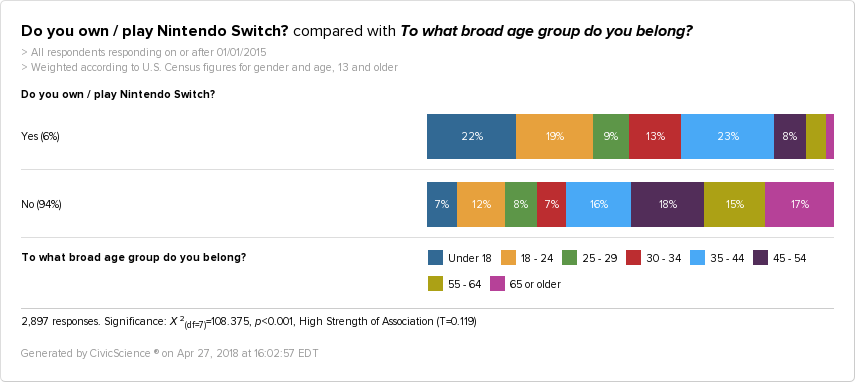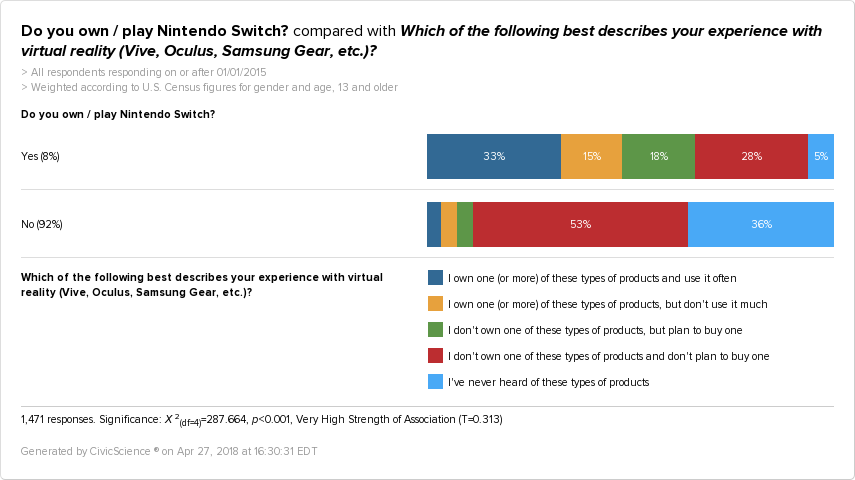The Gist: Nintendo is on the rebound with its record-breaking Nintendo Switch console, young Gen Xers and virtual reality owners love it.
After more than three decades since the release of its original in-home system, the Nintendo legacy lives on.
Following lackluster sales for the Nintendo Wii U, the successor to the hugely-popular Wii, skeptics wondered if Nintendo consoles were becoming a thing of the past, considering the growth of mobile gaming. But in March of 2017, the company responded with the release of the Nintendo Switch, a hybrid console that doubles as a docked console and a handheld mobile gaming unit.
One year later, the Switch has exceeded expectations, selling more than 10 million units by the start of this year and sending Nintendo stock soaring. However, comparing the favorability of the Nintendo Switch to a few other of the most popular gaming consoles (Wii/Wii U, PlayStation 4, and Xbox One) adds a bit of perspective to the buzz.
We found that only 6% of U.S. respondents (age 13+) say they own and/or play the new Nintendo Switch, compared to 23% who own/play Wii or Wii U, 16% who own/play Sony’s PlayStation 4, and 15% who own/play Microsoft’s Xbox One.
Given that the PS4 and Xbox One have close to five years on the Nintendo Switch, and the original Wii has more than a decade, it’s not surprising that the nascent Switch is behind.
So who is buying the Switch and why? Let’s take a look at Switch owners, and also consider whether or not the console is poised to replace older Wii systems and compete with PS4 and Xbox One.
Nostalgia: Nintendo’s not-so-secret Gen X weapon?
The console’s release also coincided with the release of the game “Zelda: Breath of the Wild,” Nintendo’s latest rendition of its famed Zelda franchise. While I’m admittedly not much of a console gamer myself these days, watching online gameplay of the new Zelda game gives me the feels. It takes me back to my formative years in the 90’s, when my life revolved around school, rollerblading, and Nintendo.
Nostalgia sells, and Nintendo knows it. The company is keeping its top-selling first-party franchises going strong, including Mario Brothers games. At the same time, they’re offering a host of games from 90’s competitor Sega for the Nintendo Switch.
And if the numbers have anything to say about it, they are doing it well. When it comes to Switch owners, we’re seeing an interesting breakdown. So far, the console has attracted a healthy amount of Gen Z, Millennials, and a striking number of 35-44-year-olds (23%).
However, there is a steep decline in ownership after the 44-year-old mark, and that makes sense. Older Gen Xers likely don’t have the same attachment to Nintendo as their younger counterparts.
That drop could also indicate that 34-44-year-old Switch owners are not just parents who may have only bought the console for their kids, but also players who are still Nintendo fans.
Will the Switch be able to attract additional audiences, perhaps would-be gamers such as myself, or gamers who are more loyal to PS4, Xbox One, PC or mobile gaming? Wii owners might be the biggest challenge — our numbers show that they are least likely to own another console system.
Time will tell, but the fact that Nintendo is able to appeal to a wide range of ages with the Switch and offer fresh takes on their first-party game franchises is a good start.
Nintendo Switch owners are early adopters when it comes to VR.
Turning our attention away from nostalgia and towards the future, we see that video game console owners are overall more likely to own and use a virtual reality device, like HTC Vive or Oculus.
Nintendo Switch owners far outweigh the competition when it comes to virtual reality device adoption. A huge 33% of Nintendo Switch owners also own one or more virtual reality devices and use it often.
That’s triple the figures for Wii/WiiU owners (11%), Xbox One owners (11%), and PS4 owners (9%).
To add some perspective, when we look exclusively at owners of VR devices, 48% of virtual reality owners age 13 and up also own/play a Nintendo Switch.
This should come as good news to Nintendo, who already has its hands in VR with a version of Mario Kart for the HTC Vive in Japan.
Breaking it down even further, we’re seeing that among Switch owners, 18-24 year-olds are the most likely to own and use a VR device. Specifically, 75% of these young Millennial owners also own and use a VR device, while the 34-44-year-old cohort pales in comparison.
From these nuances, we can start to see that Nintendo means different things to different people. Some Nintendo Switch owners may be attracted to the console for the nostalgia, while others may be early adopters drawn to the most cutting-edge gaming technology.
Nintendo Switch owners are also more likely than PS4 or Xbox owners to own another gaming console. About 45% say they own an additional console, with 64% owning a Wii/Wii U and around 47% owning an Xbox One or PlayStation 4.
That could imply a number of things. Perhaps for some, the Switch is the Wii’s replacement, while for others it’s the latest addition to their console collection. Either way, the high rate of additional console ownership gives credence to the notion that Nintendo Switch owners are early adopters.
Interestingly, Nintendo Switch owners lead in comparison to PlayStation 4 and Xbox One owners in:
- Netflix watching — 58% say they watch Netflix a few times a week
- Movie-going — 21% say they go to the movies once a month or more
When it comes to the wide world of gaming, the Nintendo Switch has already managed to capture interesting segments of the population within its first year. Some say its continued growth depends a lot upon being able to offer more third-party games.
We’ll be watching to see what changes as the console matures.











